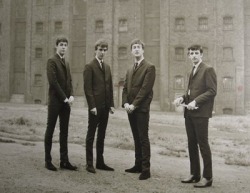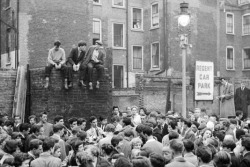Post-War Britain


Another explanation for the growing music scene in post-war Britain was the baby boom (7). The United States did not have this vast group of working class teenagers with the spare time to improvise in skiffle and change the future of music. At the same time being so close to the war like their parents, young adults of Britain also wanted distractions from the painful past and had a need to create from the destruction. This was expressed in the skiffle scene. Finally, the advent of international radio made possible by post-war technology allowed for a quick spread of American and local music to a new audience rabid for more rock.
(1)- "British Invasion." Encyclopedia Britannica. 2010. Encyclopedia Britannica Online. 20 Apr. 2010 <http://www.britannica.com/EBchecked/topic/80244/British-Invasion>.
(7)- Friendlander, Paul. Rock and Roll: A Social History. Boulder: Westview, 1996. Print.
(7)- Friendlander, Paul. Rock and Roll: A Social History. Boulder: Westview, 1996. Print.
